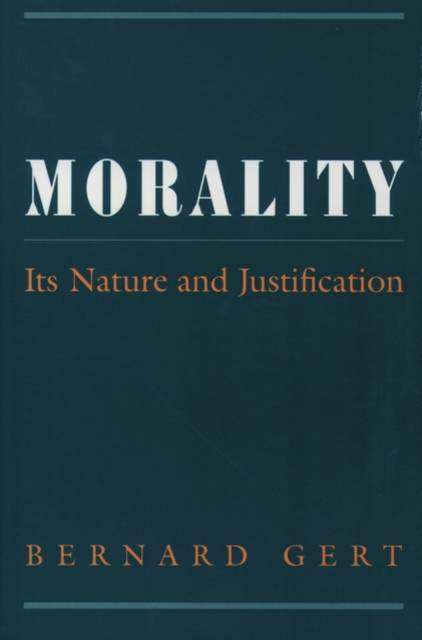
- Retrait gratuit dans votre magasin Club
- 7.000.000 titres dans notre catalogue
- Payer en toute sécurité
- Toujours un magasin près de chez vous
- Retrait gratuit dans votre magasin Club
- 7.000.0000 titres dans notre catalogue
- Payer en toute sécurité
- Toujours un magasin près de chez vous
288,45 €
+ 576 points
Format
Description
For more than thirty years, philosopher Bernard Gert has been developing and refining his distinctive and comprehensive moral theory. His classic work, The Moral Rules: A New Rational Foundation for Morality, was first published in 1970. In 1988, Oxford published a fourth revision titled Morality: A New Justification of the Moral Rules. In this final revision, Gert has produced the fullest and most sophisticated account of this influential theoretical model. Here, he makes clear that morality is an informal system that does not provide unique answers to every moral question but does always limit the range of morally acceptable options, and so explains why some moral disagreements cannot be resolved. The importance placed on the moral ideals also makes clear that the moral rules are only one part of the moral system. A chapter that is devoted to justifying violations of the rules illustrates how the moral rules are embedded in the system and cannot be adequately understood independently of it. The chapter on reasons includes a new account of what makes one reason better than another and elucidates the complex hybrid nature of rationality. Although Gert's moral theory is sophisticated, it is presented with a clarity that enables it to serve as an excellent introduction for beginning philosophy students, as well as fruitful reading for advanced undergraduate and graduate courses. Unlike most moral theories, his account of morality is developed in sufficient detail to be useful to those interested in problems of applied ethics. This book will appeal to those engaged in business ethics, engineering ethics, environmental ethics, and especially medical ethics. In the manner of the works of Thomas Hobbes and John Stuart Mill, this book addresses the general philosophical reader and at the same time makes an important contribution to the philosophical literature.
Spécifications
Parties prenantes
- Auteur(s) :
- Editeur:
Contenu
- Nombre de pages :
- 424
- Langue:
- Anglais
Caractéristiques
- EAN:
- 9780195122565
- Date de parution :
- 27-08-98
- Format:
- Livre broché
- Format numérique:
- Trade paperback (VS)
- Dimensions :
- 155 mm x 233 mm
- Poids :
- 603 g

Les avis
Nous publions uniquement les avis qui respectent les conditions requises. Consultez nos conditions pour les avis.






